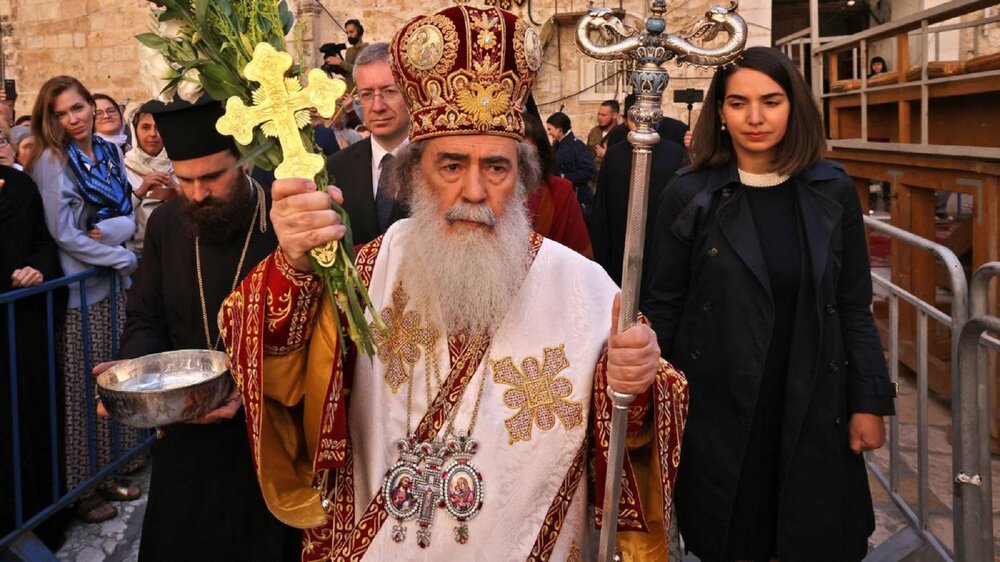Hawzah News Agency – Israel's police have capped the number of Christian pilgrims allowed to visit the Church of the Holy Sepulchre for the Easter Fire ceremony next weekend, but an early decision to restrict worshippers’ entry into occupied East Jerusalem’s Old City was overturned in a court ruling.
Palestinian and Jordanian figures have criticised the police's decision, which had alarmed the Palestinian Christian community as tensions in Jerusalem continue to rise over daily raids at al-Aqsa Mosque by Israeli forces and settlers since the beginning of April.
Palestinian lawyer Elias Khoury told Middle East Eye that several institutions representing the Christian community challenged the Israeli Supreme Court's ruling on Wednesday.
The Israeli police had initially decided to allow only 1,500 people to enter the Old City through checkpoints to go to the Church of the Holy Sepulchre and participate in the Easter Fire ceremony on Saturday.
It said it would bar any more pilgrims from entering the Old City on the pretext of safety and would close checkpoints set up at its gates.
However, Khoury and his colleague filed a petition challenging the move.
"We managed to convince the court to allow 4,000 people on Saturday. But most importantly, we agreed that the Old City of Jerusalem and the Christian quarter would remain open, even after the number of pilgrims reach capacity, and pilgrims would still be able to visit the city," Khoury told MEE.
Accordingly, Israeli police will cap the number of pilgrims entering the ancient Church of the Holy Sepulchre to 1,800 people and those allowed in the courtyard to 300. On the roofs and around the church around 1,000 and 900 people will be allowed, respectively.
Khoury explained that the Israeli police started to implement a policy of limiting the number of Christians attending holy events inside the Old City of Jerusalem in 2013 on the pretext of safeguarding people in cases of emergency.
"The heads of churches in Jerusalem, who are not Palestinians or Arabs, did not object then. So for them, they don't care much if the local community celebrated or not," Khoury said.
"Unfortunately, in Jerusalem, there is no local and national leadership to face the Israeli occupation and deal with its policies. The Palestinian Christians in Jerusalem are on the verge of disappearing, and most of them are elderly."
Palestinian presence
On Wednesday, Jordan's former crown prince Hassan bin Talal warned against Israeli policies regarding the freedom of movement and worship of both Christian and Muslim Palestinians in the Old City of Jerusalem.
"Christian worshippers were prevented from freely arriving at the Church of the Holy Sepulcher on Easter this year," he wrote in an op-ed.
"This is a violation of the freedom of worship guaranteed humanly and legally."
The Arab Orthodox institutions in Jerusalem said that the Israeli restrictions target the Palestinian presence in the city.
"This is in parallel with the restrictions on accessing the blessed al-Aqsa Mosque, which confirms that [Israel's] occupation targets all occupied Jerusalem with its Palestinian national and religious identity," it added in a statement on Thursday.
In March, Israeli police and settlers took control of part of the historic Petra hotel in the Christian quarter in Jerusalem.
Palestinian Christians criticised Israel for obstructing the Christmas season last December and for discriminating against them, saying they feel their presence is under threat in occupied East Jerusalem, the West Bank, and Israel.
They said that "Christians have become the target of frequent and sustained attacks by fringe radical groups", referring to Israeli far-right activists, who have been active recently in storming the Al-Aqsa compound.


Your Comment